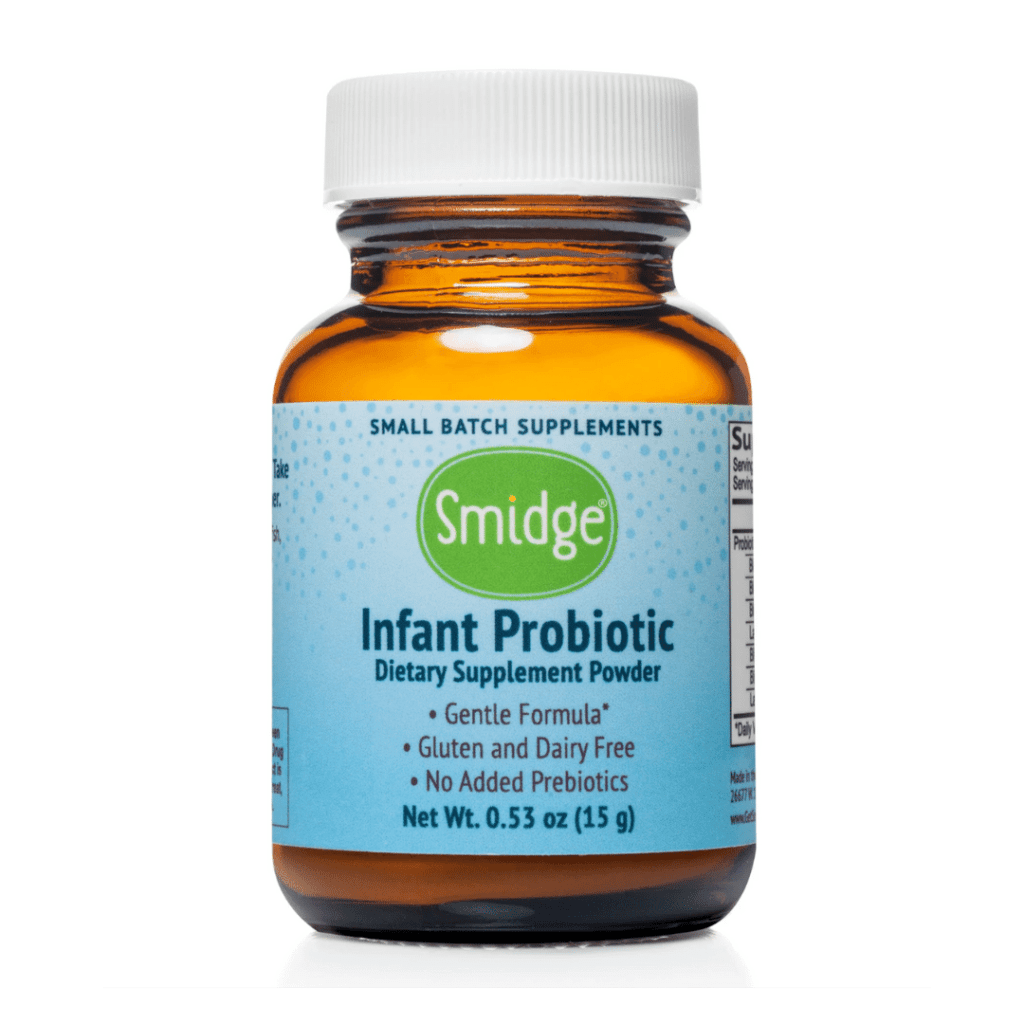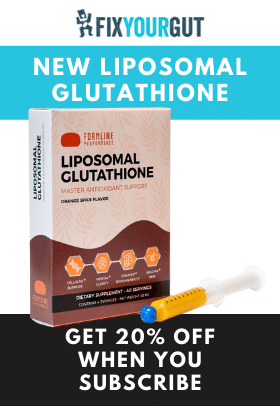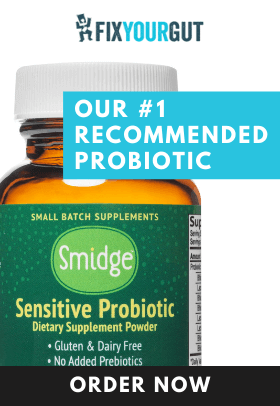Were you aware that newborns or infants sometimes should have probiotics given to them? Probiotics should be treated as medicine, and most people should not pick up any random probiotic supplement and start taking it whenever they have digestive issues.
In addition, more scrutiny should be used when people give probiotics to infants. However, this does not mean that probiotics should not be given to them when they have digestion issues. This post covers when should you need to talk to your child’s pediatrician about using a newborn probiotic and our top recommendation!
When Should You Ask Your Child’s Pediatrician When They Need a Probiotic?
If your newborn or infant has occasional digestive discomfort, I would not recommend using a probiotic. First and foremost, breastmilk is the most nutritious and easiest on digestion for most children. Breastmilk rarely causes digestive discomfort when ingested by infants. However, if feeding your child breastmilk does cause them digestive discomfort try using a rotational elimination diet (one food type at a time) to see what your child is sensitive to that is being expressed into your breast milk and, if possible, eliminate the offending food from your diet.
In addition, consume organic labeled foods, wild low mercury seafood, as well as pastured eggs/dairy/meat whenever possible if you are breastfeeding. When breastfeeding a natural diet (not the standard American diet of high fat, elevated sugary processed foods) for the mother is also healthy for your breastfeeding child. Some mothers, however, cannot breastfeed, so a proper homemade formula would hopefully be their next best option. Feeding an infant breast milk or homemade formula should reduce their chances of developing digestive issues. If your infant is occasionally suffering from digestive discomfort, then asking your child’s pediatrician about giving them organic gripe water might be able to relieve their occasional digestive discomfort.
Issues to Look Out For
- Bloating (possibly caused by gut dysbiosis and/or lactose intolerance)
- Burping (possibly caused by gut dysbiosis and/or lactose intolerance)
- Changes in stool color (pale [if pale stool occurs frequently and your infant cries often, you should see your child’s pediatrician) or yellow stools, for example). Bright red in their stool can be from constipation leading to straining and hemorrhoids (possibly caused by gut dysbiosis).
- Constipation (possibly caused by gut dysbiosis)
- Diarrhea (possibly caused by gut dysbiosis and/or lactose intolerance)
- Difficulty breathing (possibly caused by reflux disorders and/or food sensitivity)
- Excessive coughing (possibly caused by reflux disorders, food sensitivity, and/or lactose intolerance)
- Food or drink refusal (possibly caused by reflux disorders, food sensitivity, and/or lactose intolerance)
- Frequent crying (colic), especially after eating. (possibly caused by gut dysbiosis, lactose intolerance, food sensitivity, and/or reflux disorders)
- Grimacing or looking like they are in pain, especially after eating (possibly caused by reflux disorders) or before or after having a bowel movement (possibly caused by gut dysbiosis).
- Hiccups (possibly caused by reflux disorders, food sensitivity, and/or lactose intolerance)
- Insomnia (possibly caused by reflux disorders and/or food sensitivity)
- Regurgitation (possibly caused by reflux disorders, food sensitivity, and/or lactose intolerance)
- Vomiting (possibly caused by reflux disorders, food sensitivity, and/or lactose intolerance)
Finally, you might consider asking your child’s pediatrician about giving them a probiotic supplement when they are given or after they are given antibiotics to help prevent gut dysbiosis from occurring.5
Our Recommendation: Smidge Infant Probiotic Powder

I recommend Smidge Infant Probiotic Powder, and have used it with my children and clients. As always, I recommend you ask your child’s pediatrician about using Smidge Infant Probiotic Powder because it does not contain bacterial strains that produce histamine or D-lactate. Since Smidge Infant does not have histamine or D-lactate-producing strains, it is a safer probiotic.
For example, if your infant is suffering from histamine intolerance symptoms, including rashes, post nasal drip, asthma, and hives, you probably would not want to give them a probiotic that contains bacterial strains that produce histamine, which would increase the amount of histamine their body needs to detoxify. Your child will likely have increased histamine intolerance symptoms from taking a probiotic containing histamine-producing strains.
Since Smidge Infant is in powdered form, differing doses are easy to add to breast milk or homemade formula. Ask your child’s pediatrician about giving your infant one to two ten-milligram spoonfuls of Smidge Infant throughout the day when you feed them. If you are a breastfeeding mother, you might want to mix half of a ten-milligram spoonful of Smidge Infant with a little bit of breast milk and rub it on your nipples when breastfeeding your child one to three times daily to see if their digestive health improves. You will know if their digestive health improves if the above-listed infant digestive discomfort symptoms reduce or cease in frequency. Even lactose intolerance or food sensitivities may improve when supplementing the right probiotic!6
We also recommend Smidge’s product: Sensitive Probiotic as a probiotic for adult use!
Looking to solve a specific gut health issue with you or your children?
I’ve coached tens of thousands of readers to solve specific gut health issues. Click here to book a session because your health is worth it!
- https://www.stanfordchildrens.org/en/topic/default?id=gastrointestinal-problems-90-P02216 ↩
- https://www.ncbi.nlm.nih.gov/pmc/articles/PMC6506429/ ↩
- https://www.nature.com/articles/s41372-020-00829-2 ↩
- https://www.ncbi.nlm.nih.gov/pmc/articles/PMC7817514/ ↩
- https://www.ncbi.nlm.nih.gov/pmc/articles/PMC7817514/ ↩
- https://daveasprey.com/baby-gut-flora/ ↩







can adults take this child probiotic bc i have had all these same symptoms as an adult